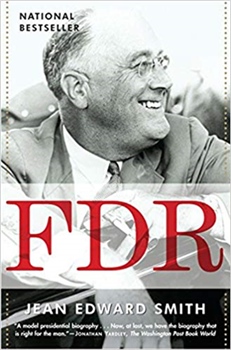Description
NATIONAL BESTSELLER - "A model presidential biography... Now, at last, we have a biography that is right for the man" - Jonathan Yardley, The Washington Post Book World One of today’s premier biographers has written a modern, comprehensive, indeed ultimate book on the epic life of Franklin Delano Roosevelt. In this superlative volume, Jean Edward Smith combines contemporary scholarship and a broad range of primary source material to provide an engrossing narrative of one of America’s greatest presidents. This is a portrait painted in broad strokes and fine details. We see how Roosevelt’ s restless energy, fierce intellect, personal magnetism, and ability to project effortless grace permitted him to master countless challenges throughout his life. Smith recounts FDR’s battles with polio and physical disability, and how these experiences helped forge the resolve that FDR used to surmount the economic turmoil of the Great Depression and the wartime threat of totalitarianism. Here also is FDR’s private life depicted with unprecedented candor and nuance, with close attention paid to the four women who molded his personality and helped to inform his worldview: His mother, Sara Delano Roosevelt, formidable yet ever supportive and tender; his wife, Eleanor, whose counsel and affection were instrumental to FDR’s public and individual achievements; Lucy Mercer, the great romantic love of FDR’s life; and Missy LeHand, FDR’s longtime secretary, companion, and confidante, whose adoration of her boss was practically limitless. Smith also tackles head-on and in-depth the numerous failures and miscues of Roosevelt’ s public career, including his disastrous attempt to reconstruct the Judiciary; the shameful internment of Japanese-Americans; and Roosevelt’s occasionally self-defeating Executive overreach. Additionally, Smith offers a sensitive and balanced assessment of Roosevelt’s response to the Holocaust, noting its breakthroughs and shortcomings. Summing up Roosevelt’s legacy, Jean Smith declares that FDR, more than any other individual, changed the relationship between the American people and their government. It was Roosevelt who revolutionized the art of campaigning and used the burgeoning mass media to garner public support and allay fears. But more important, Smith gives us the clearest picture yet of how this quintessential Knickerbocker aristocrat, a man who never had to depend on a paycheck, became the common man’s president. The result is a powerful account that adds fresh perspectives and draws profound conclusions about a man whose story is widely known but far less well understood. Written for the general reader and scholars alike, FDR is a stunning biography in every way worthy of its subject.
About the Author
Jean Edward Smith was the John Marshall Professor of Political Science at Marshall University and professor emeritus at the University of Toronto after having served as professor of political economy there for thirty-five years. Smith also served as professor of history and government at Ashland University.A graduate of McKinley High School in Washington, D.C., Smith received an A.B. from Princeton University in 1954. While attending Princeton, Smith was mentored under law professor and political scientist William M. Beaney. Professor Beaney's American Constitutional Law: Introductory Essays & Selected Cases, became a standard text and was widely used in university constitutional law classes for several years. Serving in the military from 1954-1961, he rose from the rank of Second Lieutenant to Captain (RA) US Army (Artillery). Smith served in West Berlin and Dachau, Germany. In 1964, he obtained a Ph.D. from the Department of Public Law and Government of Columbia University. Smith began his teaching career as assistant professor of government at Dartmouth College, a post he held from 1963 until 1965. He then became a professor of political economy at the University of Toronto in 1965 until his retirement in 1999. Professor Smith also served as visiting professor at several universities during his tenure at the University of Toronto and after his retirement including the Freie Universität in Berlin, Georgetown University[2], the University of Virginia’s Woodrow Wilson Department of Government and Foreign Affairs, and the University of California at San Diego.
